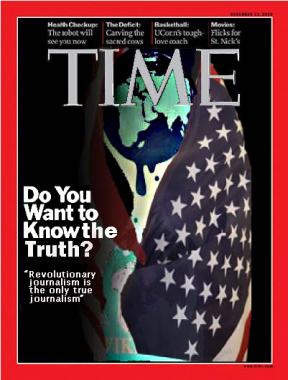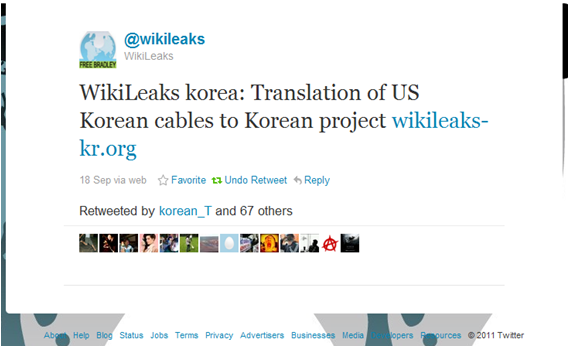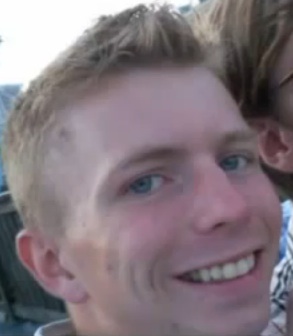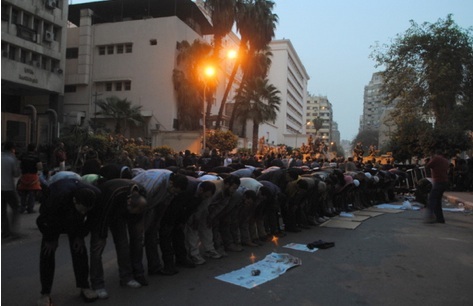
WikiLeak's rise to prominence as the world's first stateless media organization has carried it into the center of a massive storm of controversy. On one hand WikiLeaks and Julian Assange have widespread global support and have won numerous journalism awards. On the other hand, the US government portrayed them as a criminal entity, as a sort of spy organization and certainly not a member of the press protected by the First Amendment. Some top US officials called Assange a high-tech terrorist and should be prosecuted under the Espionage Act of 1917.
With inflamed rhetoric, many in the mainstream media have negatively framed the narrative of this new journalistic force and tried to distance themselves from it. By doing so, they attempted to deflect perception of WikiLeaks from the appearance of legitimacy associated with the word 'journalism'. One tactic was sensational personal attacks, with classic tabloid character assassination of Assange to distract the public from asking questions about the real actions of WikiLeaks. The other was sophisticated intellectual persuasion, where the corporate media criticized the organization, particularly questioning its journalistic status.
This article was originally published in the South Korean national newspaper, Hankyoreh, in September 20th, 2011. This is an English translation of the article.

‘Korean-translated version of WikiLeaks’ launches as a project
by Jongchan Park
Websites sharing Korean-translated versions of the U.S. embassy cables which were leaked through the whistleblowing website WikiLeaks are bursting out around the country.
The most well known one is ‘WikiLeaks Korea’. The main page of this website informs that it is “A project which accepts voluntary Korean-translation of cables related with South Korea”. It also presents the goal of “shedding light on the Truth rapidly, with the united power of Internet users.” It emphasized that “To assure volunteers in protecting their translated cables, this website provides not only privacy protection but also a secure system that can block any attempt of random deletion.” If some groups getting embarrassed by the ongoing translation project try deletion or attacks, it plans to instantly release the IPs publicly and block them, and the archive is constructed in a way that it can be swiftly restored by its real-time backup system.
WikiLeaks Korea has currently posted 25 translated cables and 12 cables which are in the process of translation. Among the 25 cables, raw materials of issues which had been reported partially in national press exist as follows: ‘Republic of Korea: 1987 Annual Terrorism Report’, ‘Lee Myung-bak Dreams Up A Canal Project’, ‘Senior KBS Correspondents See GNP's Victory Inevitable’.
 A student at the Medill School of Journalism at Northwestern University in Chicago was gracious enough to invite me to speak on a panel on Bradley Manning, the alleged whistleblower to WikiLeaks, which he had to put together for his “Media, Ethics and the Law” class. I participated in the panel this morning.
A student at the Medill School of Journalism at Northwestern University in Chicago was gracious enough to invite me to speak on a panel on Bradley Manning, the alleged whistleblower to WikiLeaks, which he had to put together for his “Media, Ethics and the Law” class. I participated in the panel this morning.
In addition to myself, the student informed me Timothy McNulty, a foreign editor for the Chicago Tribune who covered the Iraq invasion and the Afghanistan War, and Paul Rosenzweig, Carnegie Visiting Fellow and former Department of Homeland Security official, would be participating. A couple of student journalists would speak during the panel as well.
McNulty and Rosenzweig were both present in the classroom where the panel was held. I was in The Nation Magazine office in Manhattan, New York.
The student who organized the panel had me call in and put me on speakerphone. I was able to listen to what McNulty and Rosenzweig were saying.
Rosenzweig began the panel saying with assurance there isn’t any doubt the material WikiLeaks has released has caused risks. He said lists have been created of people who were listed in the documents—lists featuring the names of informants—and the Taliban has been hunting these people down.
Rosenzweig cited a Zimbabwe opposition leader who many believe to be endangered as another example of the risks WikiLeaks’ releases have created. He said there are good laws on secrecy, files released contained information on whereabouts of Osama bin Laden, and he has no problem with Manning being prosecuted.
McNulty agreed. And I was greatly disturbed by the falsehoods that McNulty let stand and made certain that I was able to comment.
I recently wrote a diary that I posted on DailyKos, which led to the banning of a DailyKos user and provoked suggestions that I might be a Republican. It had people calling me “asshole” and many were grading my post on a high school grading scale. The diary called for the release of bin Laden's death photos. (I posted it here at WL Central.)
It really doesn’t matter to me if you call me names or if you grade my post. If it promotes debate, fine. Do as you please. But, given the comments and suggestions that I now have no career unless I go work for Fox News, I feel obligated to further explain my position on releasing the bin Laden death photos. I also feel compelled to respond to many of the smartly argued and not so smartly argued comments that were posted in response.
Uploaded with ImageShack.us
I view everything surrounding the killing of bin Laden to be necessary to deciding whether to release the photos or not. In that sense, President Obama’s good decision to not give a speech at Ground Zero in New York yesterday should help inform the debate. What he did by not giving a speech was what someone like former President George W. Bush would not have had the courage to do: he chose, in that moment, to not exploit 9/11 and use it to further advance the national security agenda of America.
This story was written by @carwinb and @exiledsurfer. Recent updates by @kgosztola.
[UPDATE 2011-03-06]
 Photo by LilianWagdy of protesters praying in front of SS headquarters in Lazoghly
Photo by LilianWagdy of protesters praying in front of SS headquarters in Lazoghly
Some protesters are out in Tahrir and some are still even out in and around Lazoghly, where army clashes took place earlier. The protesters were headed to the State Security headquarters. Smoke was coming from the building. State Security has been shredding, burning and destroying documents that presumably would incriminate them, as many like Habib el-Adly, former head of the Interior Ministry, are going to be facing investigations or trials.
Amn Dawla Leaks Website tweets the following links to documents [not in English]: "Outright fraud in the election of the Chamber of Commerce"
And a few on selecting judges:
"Letter to the security of the State Requests sort of judges between the cooperative and is in preparation for the selection of the elections", SSI intervention in identifying some of the judges, and nomination of names of some judges of "collaborators" to monitor the elections
WL Central reported on a document detailing a natural gas deal with Israel. Now, here from Al Masry Al Youm, an article describing the document and giving a little background.
The U.S. Senator from Hawaii, Daniel Inouye, has confirmed that a Republican Senator placed an anonymous hold on The Whistleblower Protection Act.
Al Jazeera launches Transparency Unit:
Launched in January 2011, the Al Jazeera Transparency Unit (AJTU) aims to mobilize its audience - both in the Arab world and further afield - to submit all forms of content (documents, photos, audio & video clips, as well as “story tips”) for editorial review and, if merited, online broadcast and transmission on our English and Arabic-language broadcasts. ...
From human rights to poverty to official corruption, AJTU will fairly evaluate and pursue all leads and content submitted, without geographical, political, cultural, or religious bias.
On December 22, 2010, the Whistleblower Protection Enhancement Act Bill S.372) was killed by an unknown United States Senator, who placed an anonymous hold on the bill (reported here on WL Central).
WNYC, On the Media and the Government Accountability Project have joined forces to uncover the identity of the mystery senator.
WNYC has posted a table, "containing the names, states, and contact information for the 87 [United States] Senators still serving that could have put the anonymous hold on this bill." You can find it here.
They are asking the American public to "call, write, [or] email their Senators and ask them 'did you kill this bill?'” Then, regardless of the Senator's reply, they request you email blowthewhistle@wnyc.org with an update.
Here are some tips about "How To Track Down Anonymous Holds" from Tom Devine, legal director of the Government Accountability Project
Source: WNYC: Blow the Whistle
Birgitta Jónsdóttir, who has recently been the subject of a US Department of Justice subpoena to Twitter for her online information, will be flying to Canada tomorrow. Icelandic Interior Minister Ögmundur Jónasson has called the subpoena “very odd and grave.” Jónsdóttir herself says she wants clear answers on whether she can stay on as a member of the Foreign relations committee of Althingi and whether it is safe for her to travel abroad. “I don’t know if I can go to the US without risking that my phone or computer will be confiscated.”
She will be speaking about IMMI (Icelandic Modern Media Initiative) at the first Samara/Massey journalism seminar, of the year. IMMI brought to Iceland the most extensive free speech, freedom of the press and transparency laws of any country in the world, and Jónsdóttir was its chief parliamentary sponsor.
In a new study of the effectiveness of freedom of information laws in five parliamentary democracies, Australia, New Zealand, Ireland, the United Kingdom and Canada, Canada placed last.
Last week, the whistle-blowing website WikiLeaks began releasing secret diplomat cables sent by US embassies. It is too early to know the long-term impact of all the released material. Right after the leak, on November 29 US secretary of States Hilary Clinton gave a speech stating that the leaks are damaging to international security and undermining the diplomacy among nations that has been built over the years (New York Post, Dec 1, 2010).
This summer, while private citizens around the world are facing the most privacy eradicating laws and policies ever enacted, some media have been trying to get people outraged about the publication of secrets from public organizations. I’m not feeling it. Government secrets are not our secrets. Military secrets are not our secrets. Industry secrets are not our secrets. None of these secrets benefit society.
A public organization is, by definition, an organization where all information is to be kept completely available to the public, unless very exceptional circumstances can be proved. Democratic governments are public organizations.
A private citizen has, by definition, the right to keep all information private unless very exceptional circumstances can be proved.
Theme by Danetsoft and Danang Probo Sayekti inspired by Maksimer